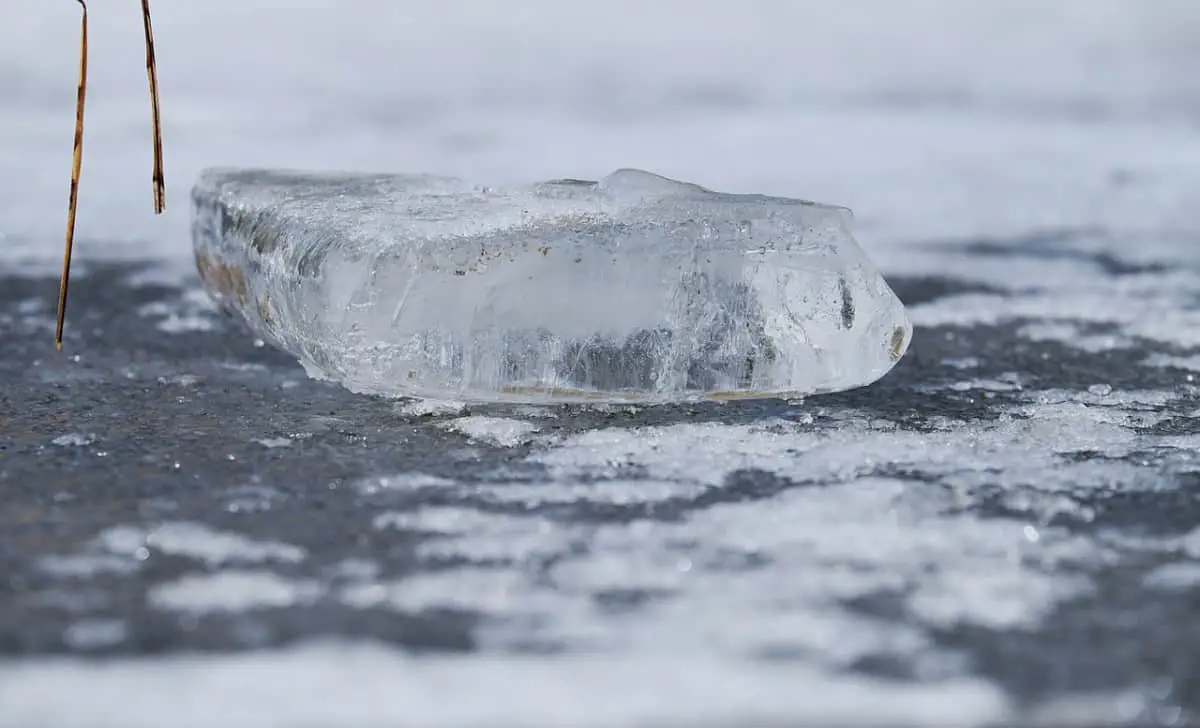Let’s have a look at why having your backyard pond freezing over might be problematic, as well as 7 easy ways to prevent ponds from freezing over.
We are obviously huge fans of a garden or backyard pond. Who doesn’t love the ambiance of calming, bubbling water, and the added fun of seeing a friendly frog or cheeky koi come up to say ‘Hello’?
Garden ponds are awesome, but because they are OUTSIDE there can be some extra considerations when you are looking after them. Your backyard pond and any plants and wildlife in it will be subjected to all sorts of weather.
Sun is great for a pond, but as we start to move into the cooler months we need to think about the effects of cooler temperatures on these gorgeous little ecosystems. Let’s have a look at why having your backyard pond freezing over might be problematic, as well as 7 easy ways to prevent ponds from freezing over.
Table of Contents
Will My Pond Freeze Over?
Not all ponds will freeze over – this depends on a few factors including where you live, what the climate is like this season and also the depth of your pond.
If your pond only freezes over for a couple of days at a time this should be ok – your fish can survive through this. If you have no fish in the pond then you don’t need to worry about freezing over, your pond will be fine with a bit of freeze.
With the enormous chill factor of the last winter, it might pay to be a tiny bit prepared this year for a potential freeze. Some very simple preparation can help prevent ponds from freezing over.
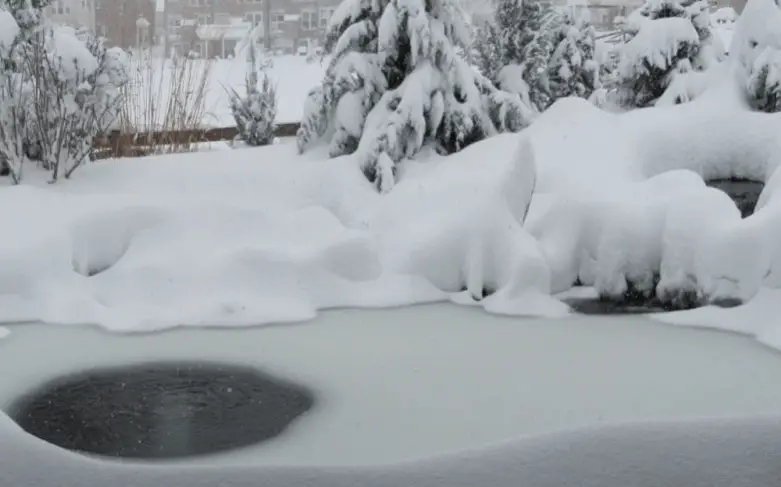
Why Is My Pond Freezing Over A Problem?
If you have chosen the right fish for your environment, they will most likely be quite happy in the cold water. Your pond will stay active and thriving underneath its frozen surface and should generally be ok. The fish themselves won’t get too cold.
But having the surface freeze over presents a problem in the decaying plants and fish waste under the surface, which can throw the water’s balance of toxins and nutrients out. It can give off noxious gases and make your fish sick.
The water in your backyard pond needs oxygen for your fish to stay healthy, and they need at least a small section of the pond to stay unfrozen to help them to ‘breathe’. If oxygen levels in the pond water drop too low as they can in winter, then your fish may get sick and even die.
Your fish pond doesn’t need to be completely unfrozen to let off the gases and look after the fish. A dinner-plate-sized hole is enough to keep things ok, so make sure you have at least this amount of ‘breathing space’ every day.
TOP TIP: Float a container of boiling water on top of the ice to defrost it for a cheap alternative method for those hard to access ponds. Never pour boiling water directly onto the ice.
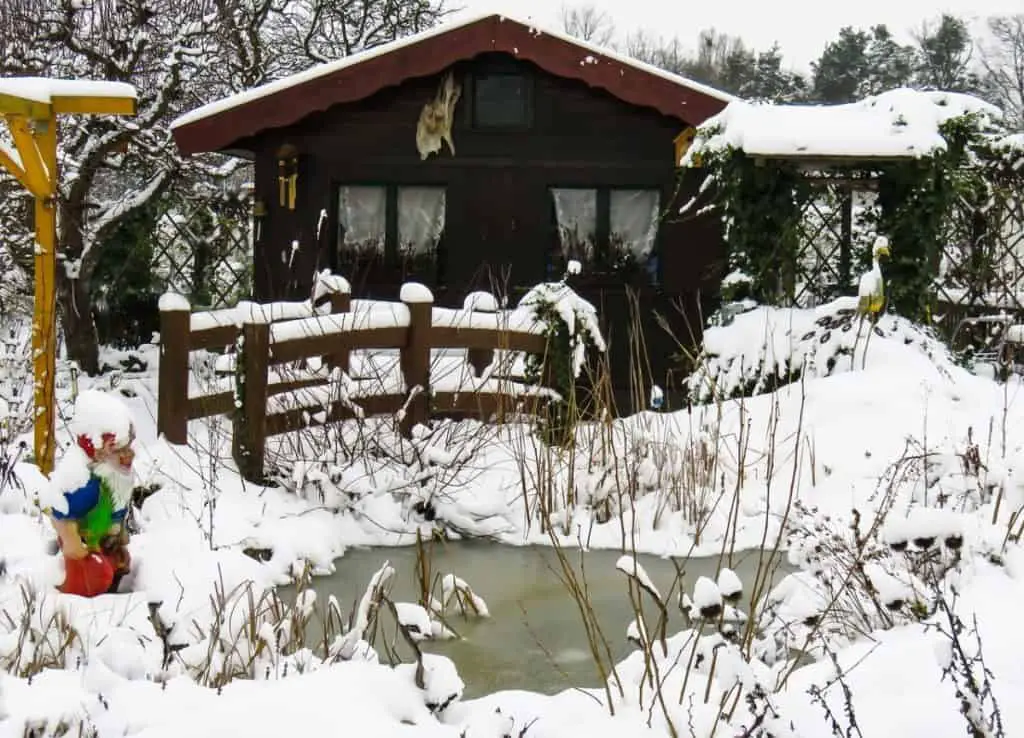
Keep it clean
You still need to do a little work to keep the pond clean from uneaten fish food, fish waste and decaying plants. Fish shouldn’t need feeding in the winter so you can ease up on their meal schedule, which will reduce waste.
Remove dead and dying plants from the water regularly to stop any gases from building up in the water.
Read: 7 Ways to keep your pond clear.
Make sure that oxygen continues to circulate through the water and that the filter is working well to keep it clean.
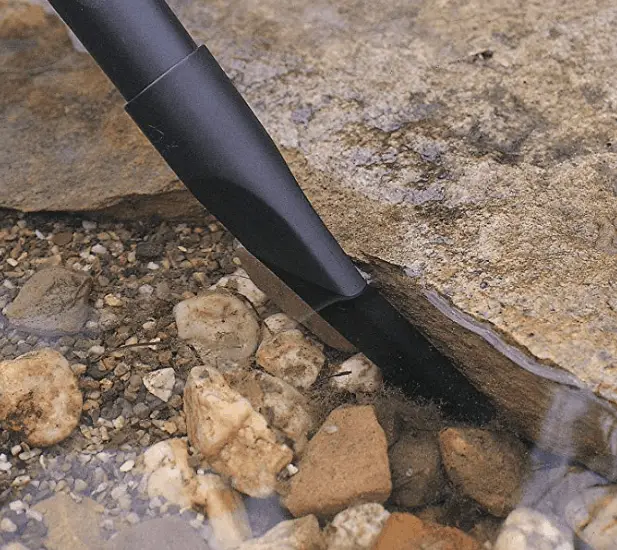
7 Ways To Prevent Ponds From Freezing Over
There are several different ways to prevent your pond from freezing over, and again whether they work will depend on how big and deep your pond is, as well as how cold it gets where you live. Some ponds can get away with power-free solutions to the problem that is obviously more cost-effective because they don’t use electricity.
If money isn’t an object, or your time is a bit more restricted, you may want to get a water heater for the pond, we will discuss a few of these as an option as well.
Remember a few important rules if your pond has frozen over:
- Don’t break the ice or pour in boiling hot water
- If your pond has frozen over overnight, it is important not to break the ice with a hammer or something similar – the vibration of the shock waves can make your fish quite sick.
- You should also not pour hot water into the pond as this can hurt the fish as well.
Use one of the following fish-friendly, methods instead to prevent freezing up ponds…
7. Adjust your filter and keep it working well
Making sure that your filter keeps running and working properly throughout winter is important for a few reasons. The filter will help to reduce fish waste and other nutrient decay and keep the pH levels more balanced and noxious gases reduced. It also helps to stop the water from becoming still enough to freeze.
As well as keeping your filter working properly, you can adjust its position and direction to help the fish create a warm pool of water deeper below the surface. Once the water drops below 4 degrees, the warmer water sort of separates and becomes denser, moving to the bottom of the pond. The fish will move to this part of the water.
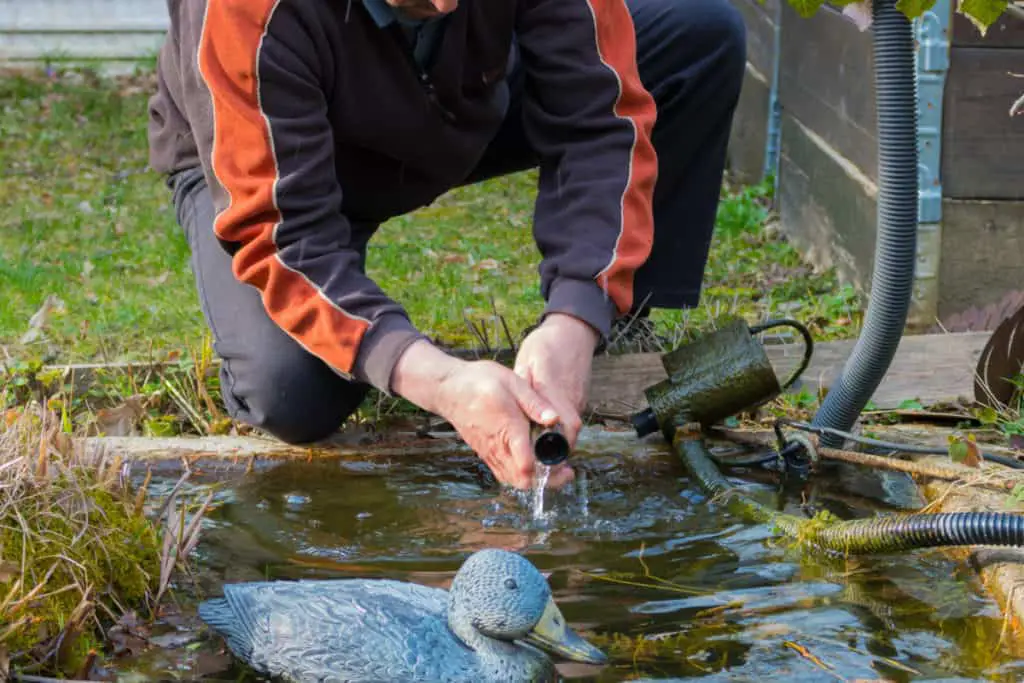
You can raise your pumps from the base of the pond up to the top part, putting them in shallower areas. Move filter outlets to just below the surface and direct their flow horizontally so they don’t put cold water down to the bottom of the pond.
This helps to keep the cold water at the top and the warmer water below, in a nice little holiday haven for your fish, while the water still circulates and stays filtered keeping them healthy.
Fountains and waterfalls are handy for cooling water down through the summer and are great for keeping your fish fresh and cool. But in the winter, they cool the water down further, so turn these off during the coldest months.
6. Make your pond deeper
Ponds that are more than 36 inches deep are easier to stop from freezing completely and will be deep enough to have warm pockets of water down below for your fish to be happy in. The recommended depth for a fish pond is actually 48 inches, deeper if you keep Koi – they survive best in depths of between 48 and 60 inches.
If it is possible to adjust the depth of your pond and make it deeper, this would be a good first step to stopping it from freezing over. If you are still in the planning stages of creating your pond it is well worth considering having at least a section of it deeper than 36 inches.
Read how deep should a Koi pond be for more information.
5. Float something
This is this quickest and cheapest method of stopping a body of water from freezing over. Farmers have been using this trick for generations to keep stock water supplies from freezing as well – you just float something on the surface that moves around, such as some ping pong balls, tennis balls or empty water bottles.
The constant movement of the object will keep air getting into the pond and stop the surface from completely sealing. This only works in areas where the water doesn’t get below freezing for more than a few days at a time, however.
If you are in an area that faces colder winters, a simple floating device may not work – you may need to invest in something a bit more hard-working. If your pond faces the possibility of freezing for more than a few days at a time and especially if you are facing weeks or months of frozen temperatures, then look at other heating options as well.
4. Cover your garden pond
You can cover your pond with a premade cover or use a section of netting, tarpaulin or bubble wrap, stretched over a frame. Whether you decide to cover your pond will depend on how big and strangely shaped it is, but it is the smaller ones that are more likely to freeze, and these ones are easier to cover.
You can create a sort of greenhouse effect by covering the pond which will trap any warmth from any sunny days and retain the warmth from the water.
Electrical piping or conduit is a good material for a frame – for a good article on how to build a framed winter cover see here: How to build a pond cover for winter.
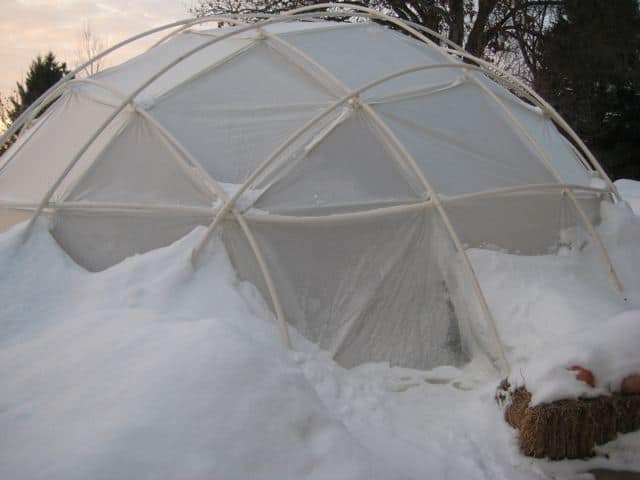
3. Polystyrene Ice Preventer
A nifty way to prevent ponds freezing over is to invest in an ice preventer. The polystyrene ice preventer floats on top of the pond and works with an air pump pumping air bubbles down to the warmer regions of the pond which then brings that water up again, keeping the water from freezing.
This is a lovely cheap option compared to running a heater all the time but may not work in very cold snaps.
The Hozelock Floating Ice Preventer is one simple, economical and effective model:
2. Pond Aerators
A pond aerator like the Laguna Aeration Kit can prove to be very effective to prevent ponds from freezing over in all but the very longest and coldest of snaps. These can be solar powered with a battery back-up, which is a cheaper option than having to hook them up to your electricity.
Make sure that you locate the aerator in the shallow part of the pond to help stop this part from freezing over, as well as not disturbing the warmer water and the fish at the bottom of the pond.
The Primrose Oxygenator Aerator is an excellent solar-powered model:
Most pond aerators only have a short battery backup which will get you through around 4-6 hours of the coldest part of the night.
If you are very handy, you can create your own pond aerator using an aerator pump, an inverter and lots of high voltage batteries – check out this video here if you are interested in trying some DIY:
You can also buy pond aerators that connect to the electricity, including some low wattage models that aren’t too expensive to run.
Oase makes some good models including a few that do double duty. The Oase OxyTex is a combined aerator and filter which helps to add oxygen to a pond, helping to keep it clean and encourage nutrient decomposition as well as keeping the water moving to stop the surface freezing.
1. Invest in a Pond Heater
You can buy many different sizes and strengths of water heater. Some will float and just keep a small section defrosted to let the gases out that we mentioned above. Others are advanced enough to heat all of the water in the pond and are very good if you have particularly fussy fish.
Smaller heaters float in the surface of the pond and have a heating element attached – these work by keeping a small area defrosted. These have a long power cord that you can attach to an external powerpoint and generally don’t need to run except overnight during the coldest couple of weeks of the year.
Superfish makes a good small heater and ice guard which works by keeping a small section of your pond unfrozen:
You can purchase a more involved heater system that slots into the hose between the pump and filter for your pond and works by heating all of the water. A heater of 1 kilowatt will increase 1000 liters by one degree per hour. Having one running all of the time can be expensive but you shouldn’t need to run it all the time if your aim is to just keep it above freezing.
Whole pond water heaters are good little mechanisms and can work in as low as -20 degrees. There are models that have a thermostat to turn the heater on and off as needed to conserve your power. You can choose from a number of different wattages depending on the size of your pond and how cold it gets.
The Blagdon Affinity Ice Vent Pond Heater is another excellent heater for your whole pond and can be used to as low as -10 degrees and for ponds up to 5000
Make sure that whatever heater you are looking at, it is strong enough to heat your pond depending both on the volume of the pond and how cold the temperature drops. Each heater will have a recommendation for how low the temperature can go and still have the heater work effectively.
Final Tips To Prevent Ponds Freezing Over
You only need to be concerned if your pond freezes over for more than a couple of days, because fish will be fine in that short a time.
The main concern for keeping your pond unfrozen is not the water temperature, because your fish don’t mind the cold, but to keep a small section unfrozen to allow oxygen in and noxious gases out.
Our top seven methods to prevent ponds from freezing over include:
- Keep your filter maintained and working, while adjusting the stream to help create a warmer patch for the fish down below
- Add to the depth of your pond if possible, allowing for at least one part of it to be lower than 36 inches
- Float something in the pond such as a tennis ball
- Invest in a cover for your pond
- Try a polystyrene ice preventer
- Invest in an aerator designed for dealing with winters – these come in solar and battery-powered models as well as those that connect to the electricity
- Invest in a heater for your pond – you could consider a floating one that will just unfreeze a portion of the pond, or one that connects to the water source to heat the whole pond.
Keep an eye on your pond no matter what temperature you are used to having – you never know when a cold snap might hit.
Make sure that your pond is cleared of plant debris that can rot in the water.
Consider using more than one method of keeping the water unfrozen. Check that solar or battery powered methods are enough and make use of a heater as well for a short time if necessary. You can just keep heaters working overnight for only the coldest of nights and this will reduce your costs and maybe enough to get you through the worst of it.
Try to defrost a hole on a daily basis with a pan of hot water
This is a very old-school, low-tech way of managing the problem. Your pond will most likely freeze during the night, so every morning heat a saucepan of water on the stove, then take the pan outside and put the pan directly on the ice until it defrosts a pan-sized hole in the surface. Do not pour boiling water into the pond. Do this each day and your problems are generally solved quite easily and cheaply.
We hope this article on how to prevent ponds from freezing over has been useful to you and that you now know how to stop your fish pond freezing over this winter.
- How many eggs do Koi lay? How many and how often
- How long are Koi fish pregnant? Live Spawning or egg Layers
- Do Koi fish Eat Mosquito Larvae? Cool Facts!
- American Flagfish (Jordanella floridae) Complete Care Guide
- How to Oxygenate a Pond | 3 Ways to Oxygenate a Fish Pond

I have been working in the tropical fish industry for over 30 years now and I’m still learning. Everyday is a school day in this hobby. In my spare time I play golf very badly!


